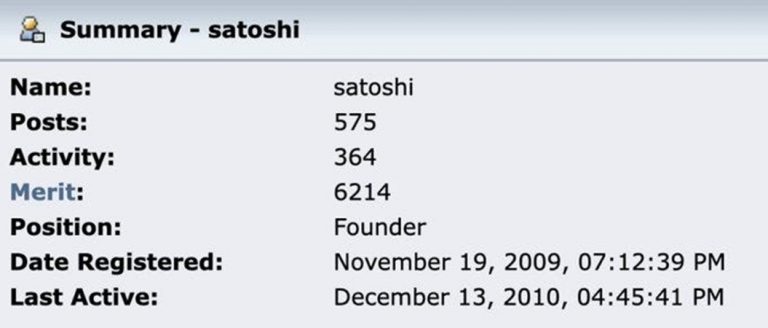
Today marks the 13th anniversary of the last known activity of Satoshi Nakamoto, the mysterious creator of Bitcoin, on the BitcoinTalk forum.
On December 13, 2010, Satoshi posted a reply to a thread titled “Re: Can we have IP Transactions Please?” in which he explained why he opposed the idea of adding IP addresses to transactions. He wrote:
“I don’t believe a second, compatible implementation of Bitcoin will ever be a good idea. So much of the design depends on all nodes getting exactly identical results in lockstep that a second implementation would be a menace to the network. The MIT license is there so that people can be free to use and modify the software, and those modifications will be beneficial at best and harmless at worst. It’s not there to facilitate alternative versions of Bitcoin which beat their drum while everyone else follows the same consensus.”
Register for Tekedia Mini-MBA edition 19 (Feb 9 – May 2, 2026): big discounts for early bird.
Tekedia AI in Business Masterclass opens registrations.
Join Tekedia Capital Syndicate and co-invest in great global startups.
Register for Tekedia AI Lab: From Technical Design to Deployment (next edition begins Jan 24 2026).
That was the last time anyone heard from Satoshi on the forum, although he continued to exchange emails with some developers until April 2011. His disappearance has sparked many speculations and theories about his identity, motives, and whereabouts. Some believe he is dead; some think he is hiding; some suspect he is working on a new project, and some even claim to be him.
But whoever he is, and wherever he is, Satoshi Nakamoto has left behind a legacy that changed the world of finance and technology forever. He invented a decentralized, peer-to-peer, digital currency that operates without intermediaries or central authorities. He designed a novel consensus mechanism based on proof-of-work that secures the network and prevents double-spending.
He released the source code and the white paper for anyone to study and improve. He inspired a global community of developers, entrepreneurs, activists, and enthusiasts who continue to innovate and experiment with Bitcoin and its underlying technology, the blockchain.
Satoshi Nakamoto may be gone, but his vision lives on. Today, we celebrate his contributions and honor his achievements. We also explore some of the controversies that have emerged around Bitcoin and its development over the years. Some of these include:
The block size debate: This is an ongoing dispute over how to increase the capacity of the network to handle more transactions per second. Some argue for increasing the size of each block that contains transactions, while others propose alternative solutions such as Segregated Witness (SegWit) or Lightning Network.
The hard forks: These are splits in the blockchain that result from incompatible changes in the protocol rules. Some examples are Bitcoin Cash (BCH), Bitcoin SV (BSV), and Bitcoin Gold (BTG), which diverged from the original Bitcoin due to different visions or agendas.
The environmental impact: This is a concern over the amount of energy and resources that are consumed by the mining process that secures the network and generates new bitcoins. Some critics claim that Bitcoin is wasteful and unsustainable, while others defend its efficiency and innovation.
These are just some of the topics that have sparked debates and discussions among the Bitcoin community and beyond. They reflect the diversity of opinions and perspectives that exist within this dynamic and evolving space. They also show how Bitcoin is not just a technology, but a social phenomenon that challenges and transforms our understanding of money, power, and trust.
We also wonder what he would think of the current state of Bitcoin and its future prospects. Would he be proud of how far it has come, or disappointed by how much it has deviated from his original idea?
Would he support the scaling solutions that have been proposed or implemented, or oppose them as compromises to his design principles? Would he join the debates and controversies that have divided the community, or remain silent and let the code speak for itself?
We may never know the answers to these questions, but we can always speculate and imagine. And we can always thank him for giving us Bitcoin, a gift that keeps on giving.



